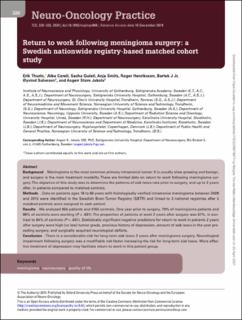| dc.contributor.author | Thurin, Erik | |
| dc.contributor.author | Corell, Alba | |
| dc.contributor.author | Gulati, Sasha | |
| dc.contributor.author | Smits, Anja | |
| dc.contributor.author | Henriksson, Roger | |
| dc.contributor.author | Bartek, Jiri Jr. | |
| dc.contributor.author | Salvesen, Øyvind | |
| dc.contributor.author | Jakola, Asgeir Store | |
| dc.date.accessioned | 2021-04-26T14:03:19Z | |
| dc.date.available | 2021-04-26T14:03:19Z | |
| dc.date.created | 2020-04-17T22:17:46Z | |
| dc.date.issued | 2020 | |
| dc.identifier.citation | Neuro-Oncology Practice. 2020, 7 (3), 320-328. | en_US |
| dc.identifier.issn | 2054-2577 | |
| dc.identifier.uri | https://hdl.handle.net/11250/2739709 | |
| dc.description.abstract | Background
Meningioma is the most common primary intracranial tumor. It is usually slow growing and benign, and surgery is the main treatment modality. There are limited data on return to work following meningioma surgery. The objective of this study was to determine the patterns of sick-leave rate prior to surgery, and up to 2 years after, in patients compared to matched controls.
Methods
Data on patients ages 18 to 60 years with histologically verified intracranial meningioma between 2009 and 2015 were identified in the Swedish Brain Tumor Registry (SBTR) and linked to 3 national registries after 5 matched controls were assigned to each patient.
Results
We analyzed 956 patients and 4765 controls. One year prior to surgery, 79% of meningioma patients and 86% of controls were working (P < .001). The proportion of patients at work 2 years after surgery was 57%, in contrast to 84% of controls (P < .001). Statistically significant negative predictors for return to work in patients 2 years after surgery were high (vs low) tumor grade, previous history of depression, amount of sick leave in the year preceding surgery, and surgically acquired neurological deficits.
Conclusion
There is a considerable risk for long term sick leave 2 years after meningioma surgery. Neurological impairment following surgery was a modifiable risk factor increasing the risk for long-term sick leave. More effective treatment of depression may facilitate return to work in this patient group. | en_US |
| dc.language.iso | eng | en_US |
| dc.publisher | Oxford Academic | en_US |
| dc.rights | Navngivelse-Ikkekommersiell 4.0 Internasjonal | * |
| dc.rights.uri | http://creativecommons.org/licenses/by-nc/4.0/deed.no | * |
| dc.title | Return to work following meningioma surgery: a Swedish nationwide registry-based matched cohort study | en_US |
| dc.type | Peer reviewed | en_US |
| dc.type | Journal article | en_US |
| dc.description.version | publishedVersion | en_US |
| dc.source.pagenumber | 320-328 | en_US |
| dc.source.volume | 7 | en_US |
| dc.source.journal | Neuro-Oncology Practice | en_US |
| dc.source.issue | 3 | en_US |
| dc.identifier.doi | 10.1093/nop/npz066 | |
| dc.identifier.cristin | 1806885 | |
| dc.description.localcode | This is an Open Access article distributed under the terms of the Creative Commons Attribution Non-Commercial License (http://creativecommons.org/licenses/by-nc/4.0/), which permits non-commercial re-use, distribution, and reproduction in any medium, provided the original work is properly cited. For commercial re-use, please contact journals.permissions@oup.com. | en_US |
| cristin.ispublished | true | |
| cristin.fulltext | original | |
| cristin.qualitycode | 1 | |

